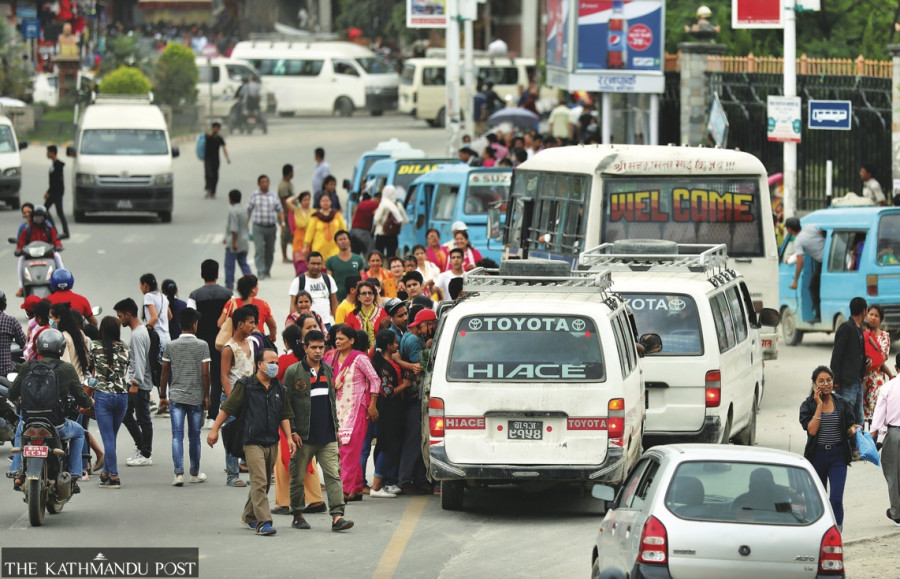Valley
Passengers complain of being shortchanged after bus fare hike
Rs 18 is the minimum fare and Rs35 maximum in Kathmandu Valley as per the new rates approved by the provincial government.
Anup Ojha
Rajesh Paudel, who needs to commute every day from Kausaltar to New Baneshwar, complained that bus operators have been shortchanging him for the past three days.
“The government has increased the bus fare to Rs 18 from Rs 15, but for the past three days bus conductors have been charging me Rs 20,” complained Paudel, 27, who works in a private company.
“When I ask for two rupees return, conductors say they do not have change,” said Paudel.
After recent protests by transport entrepreneurs, the Bagmati Province Physical Infrastructure Development Ministry hiked the bus fare in the province including Kathmandu Valley from Monday. After the hike, public bus passengers have to pay a minimum of Rs 18 for up to five kilometers.
While passengers are being cheated by buses citing unavailability of change, traffic police say they have not received any such complaint. Consumer right activists have, meanwhile, criticised the decision to hike the fare as an ‘unwise decision’ made by the government to appease transport operators.
Earlier this month, after some transport operators unilaterally hiked fares, traffic police started booking such transport operators on the charge of overcharging passengers. Then some transport operators in the first week of October had staged a protest along the Ring Road in the Capital by parking their buses on the road and blocking vehicular movement.
The government ultimately bowed to the transporters’ pressure. The provincial ministry has increased the bus fare based on distance in Kathmandu Valley and in other districts of the province, which consists of 13 districts, by 23 percent.
“The hike is unjustified,” said Jyoti Baniya, chairperson of the Forum for Consumers’ Rights Nepal.
Baniya said he also paid the hiked fare and two rupees extra because the conductor didn’t return the change.
“On the very first day (Monday) the conductor charged me Rs20, who will look at this malpractice?” Baniya fumed.
He further said this was not an appropriate time to hike the bus fare as everything is getting expensive for commoners, and many people are jobless due to the Covid-19 pandemic. “It shows that the government is working in favour of transport operators or business people instead of the general public, this is an unwise decision,” said Bainya.
A high profile traffic police official requesting anonymity said the government’s decision to hike the fare was impractical. “Traffic police can’t go after every bus or conductor for shortchanging Rs2, but a bus operator serving around 2,000 passengers daily would earn Rs4,000 extra this way. And this will be around Rs120,000 per month,” said the official.
Based on the new fare list, a passenger has to pay Rs 23 for 10 kilometres, Rs 27 for 15 kilometers, Rs 30 for up to 20 kilometres and Rs 35 for routes longer than 20 kilometres.
“It’s certain that the bus operator will be charging Rs 25 for actual charge of 23 and Rs 30 for actual charge of 27,” said the official.
When the Post contacted Superintendent of Police Sanjib Sharma Das, also spokesperson at the Metropolitan Traffic Police Division, he said the division has not received any complaints from the public. “We will punish bus operators if they are found overcharging or shortchanging passengers,” said Das.
In July second week, the Sher Bahadur Deuba administration had assigned the Department of Transport Management to allow transport entrepreneurs to jack up bus fares on inter-provincial routes by a sharp 28 percent. In the decision the Cargo carriers serving routes in the Terai and hills were permitted to hike freight charges by 26 and 20 percent, respectively.
The last time transport fares went up was in September 2018 when the government decreed a flat 10 percent hike.




 18.95°C Kathmandu
18.95°C Kathmandu.jpg)













